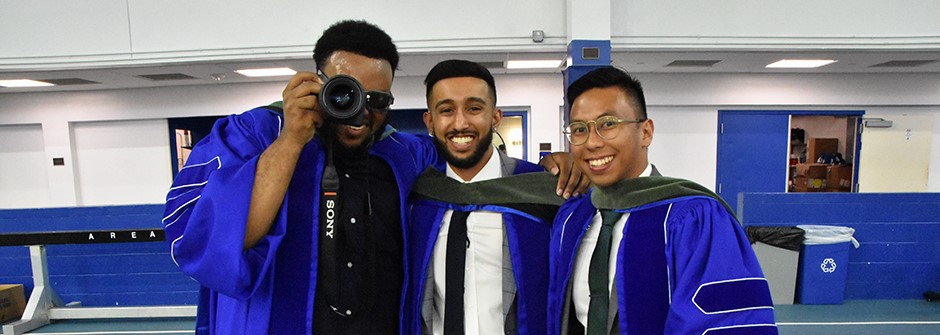
Frequently Asked Questions
Answers to many common questions about the Ph.D. in Health Sciences program can be found on the following webpages:
- Admission Requirements
- Program Details
- Curriculum
- Department of Interprofessional Health Sciences and Health Administration
Answers to a select number of other frequently asked questions are below.
How many credits does it take to graduate?
Our Ph.D. in Health Sciences degree is 57 credits beyond the master's degree or 48
credits beyond the clinical doctorate degree. For example, Doctor of Nursing Practice
(DNP), Doctorate in Physical Therapy (DPT), Doctorate in Occupational Therapy (OTD),
Doctor of Law or Doctor of Jurisprudence (JD) are all considered clinical doctorates.
Do you allow part-time status?
Yes. Students can complete the program at a full-time (3 ½-year program) or part-time
(6-year program) pace.
Can I work while enrolled in the program?
Most students are employed full-time while pursuing their Ph.D. degree.
How long does it take to get the Ph.D. degree?
As the program accommodates both full- and part-time students, the time-to-complete
varies depending on a student's time commitment to the program. Full-time students
complete the program in 3 ½ years with part-time students completing in 6 years.
How frequently are the classes offered?
Classes are offered once a week synchronously online and are currently scheduled either
Tuesday, Wednesday or Thursday night during the academic year. Program competency
exams are administered over the summer semester to facilitate the learning experience.
The program's Research Forum Series is offered monthly throughout the entire academic
year.
Will I be doing a research project?
Yes. Our Ph.D. students design, implement and defend a dissertation study.
What major exams are required?
The Qualifying Exam is taken after the student completes the four key research courses;
it evaluates the student's basic research skills. The Candidacy Exam is taken after
the student completes GMHS 6302 Topical Seminar- Research I and GMHS 6311Topical Seminar
II; it evaluates the student's knowledge and understanding of their research topic.
The Dissertation Defense is the final evaluation; it evaluates the student's ability to defend their research studies.
Will an advisor be assigned to me?
Each student is assigned an advisor when he or she is admitted.
Are all courses offered on campus or online?
All courses follow a synchronous online approach to learning except for speech science
and movement science laboratory coursework that may require an on-campus laboratory
experience. These laboratory experiences are determined in advanced between the student
and advisor and are based upon the student's research interest.
If I am accepted, what is the next step?
You will be assigned your faculty advisor who will help you plan your coursework.
How long does the admissions committee take to inform candidates of admissions decisions?
Admission decisions are made on a rolling basis and are usually communicated within
one month of the application. Preferred admission deadlines:
June 1 - Application deadline for admission starting in a Fall semester
November 1 - Application deadline for admission starting in a Spring semester
How do I handle tuition reimbursement if my employer is paying for my degree program?
Some students are offered full or partial tuition reimbursement by their employers.
Check with your employer for more information. Tuition reimbursement is typically
processed at the end of a semester. If you are offered reimbursement, you will still
be responsible for initial payments on your tuition. Contact the Seton Hall University
Office of the Bursar for more information.
Are international students eligible to receive an F-1 student status to study in the
U.S. with this program?
Unfortunately, students enrolled in fully online programs are not eligible to study
in the United States on an F-1 Student status. However, due to the online course delivery
in this program, it’s possible to complete the program from anywhere in the world.
If coming to the United States is critical, please consider one of our on-campus programs
such as the Master of Healthcare Administration (https://www.shu.edu/academics/mha.html) .
